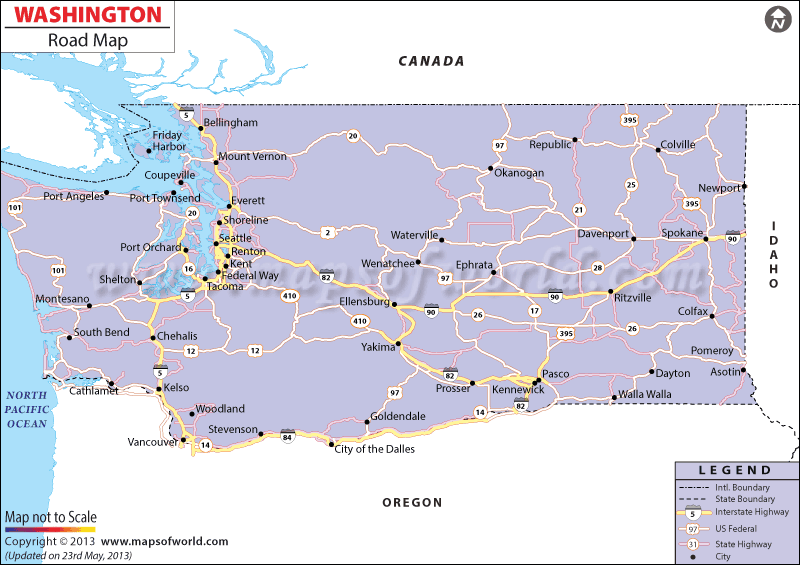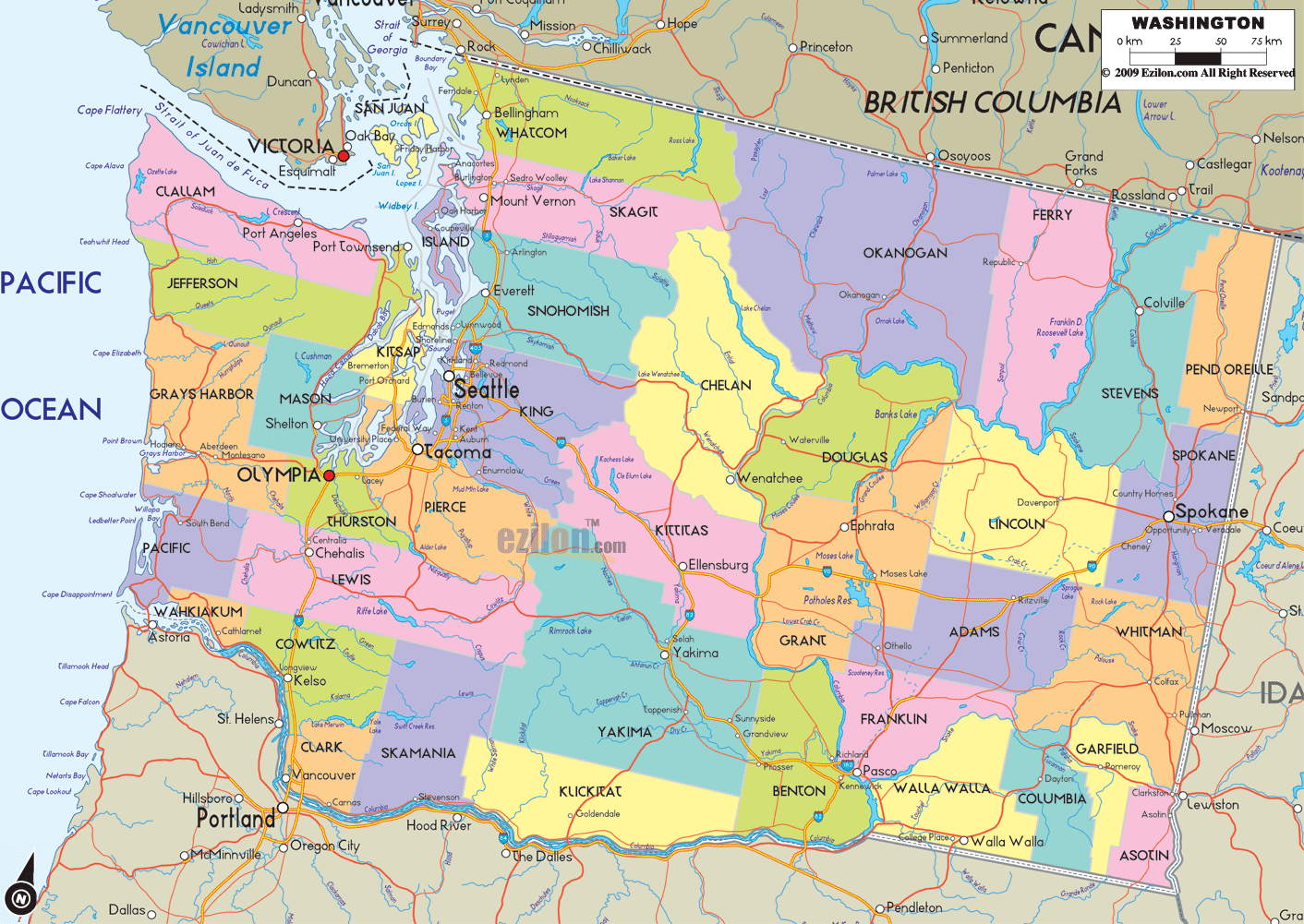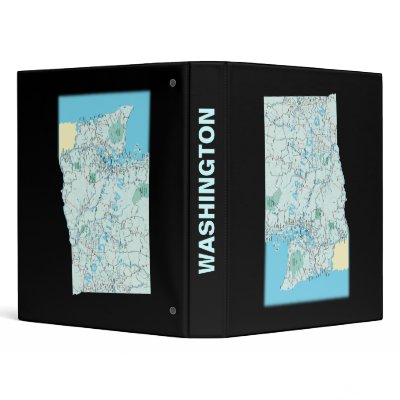Blue Highways: Pullman, Washington
Unfolding the Map
 We make a little diversion out of Idaho to an airfield in Pullman, Washington so that William Least Heat-Moon (LHM) can take a small plane flight with Fred Tomlins over the Palouse and the Snake River Canyon. It gives us ample time, given Tomlins' reminiscences about the Vietnam War, to think reflect on war - both those who make it and those who fight it. To see where Pullman lies in relation to Moscow (not far), fly over to the map!
We make a little diversion out of Idaho to an airfield in Pullman, Washington so that William Least Heat-Moon (LHM) can take a small plane flight with Fred Tomlins over the Palouse and the Snake River Canyon. It gives us ample time, given Tomlins' reminiscences about the Vietnam War, to think reflect on war - both those who make it and those who fight it. To see where Pullman lies in relation to Moscow (not far), fly over to the map!
Book Quote
"After his [Fred Tomlins] afternoon class, we drove nine miles out to the airfield at Pullman, Washington. Pullman, home of Washington State University, and Moscow are the 'U cities.' We rented a Cessna 150 and flew southeast toward the lower Snake River Canyon.
"....He pulled out and leveled off. 'I'll show you the Snake River Canyon. One of our great rivers and almost unseen because it's so hidden.' He nosed around toward the setting sun. 'I was just thinking about one Christmas day in Viet Nam. Sounds piss-poor to tell it, but we were on a bombing run to Laos because Nixon said we couldn't bomb in Nam on Christmas. The nape - napalm cans - had been painted like candy canes. On the ADF radio they were playing Creedence Clearwater singing 'Rollin' Down the River.' I sang all the way.' He looked at the altimeter and pulled the nose up. 'I guess the war was a hundred-thirty-billion-dollar waste, but it was a hell of a time if you lived.'"
Blue Highways: Part 7, Chapter 1
 Downtown Pullman, Washington with part of Washington State University. Photo at The Evergreen Scene blog. Click on photo to go to host page.
Downtown Pullman, Washington with part of Washington State University. Photo at The Evergreen Scene blog. Click on photo to go to host page.
Pullman, Washington
I'm going to start this post with a few words about Pullman, Washington. I've never been there, but it's very close to Moscow and therefore, both cities have major universities for their states as LHM says. In addition, they are land grant universities. I had heard the term "land grant" in describing a university and how it came about, but I never really understood what it was about. Due to the demand for agricultural education, the Morrill Land-Grant Acts were proposed and eventually signed into law by Abraham Lincoln. Subsequent laws were signed extending the program to the southern states after the Civil War. Each state was granted a certain amount of acreage based on its representation in Congress, and could use that land or proceeds to start a university. Today, each state has at least one land-grant institution. Washington's is Washington State University in Pullman, and Idaho's is the University of Idaho in Moscow. In New Mexico, where I live, our land grant university is New Mexico State. A list of all the land grant universities can be found here.
I also want to make mention of the area that LHM is traveling through in this chapter. The region is called the Palouse. It is a very fertile region, primarily used for growing wheat and legumes (and perfect for land grant universities to teach agricultural skills). The above-mentioned Fred Tomlins, with whom LHM met with in Moscow, says that the Palouse is 200 feet of fertile topsoil, and his claim that the land was the first to sell for over $1000 an acre is supported by the fact that the first efforts to grow wheat in the area were so successful that it led to a mini-land rush. The population at one time was larger than that in the Seattle area. The region is also famous for lending its name to that famous American horse, the Appaloosa. Though Spanish in origin, the American Appaloosa was distinctly bred by the Nez Perce tribe.
Okay, that's the extent of the information I wanted to impart about the region. Now, I'm going to divert into a reflection on the topic in the quotes above - war. Occasionally, I will ask myself why I have a certain opinion or feeling. My feelings on war are mixed. I'm not specifically a pacifist, as I believe that people have a right to defend themselves. I also believe that occasionally, there is a threat so great that offensive action is necessary to confront it. However, given all circumstances, I would like to believe that fighting or going to war is the action of last resort. I have occasionally involved in war protests, especially against those wars that I failed or wasn't able to understand the rationale.
But every person who has an uneasiness with war, and that includes most liberals, must confront the fact that there are levels of war and conflict. There is the planning, strategizing and executing of war which is usually done by political elites according to their own rationales, and there is the actual fighting of the war, which is done by those in military units on the battlefields. Those who fight have a range of reasons for being in the military, but in our modern volunteer army and increasingly in these difficult economic times, there are men and women for whom the call of the military is not just a duty but also a livelihood.
Too many times, I've seen people who oppose wars vent anger on military personnel, rather than those who plan and execute them. And too many times, I've seen those who fight come back, sometimes wounded physically and psychologically, and then get ignored by the society that asked them to go on its behalf. I have been guilty of this lapse of judgment, if crime is too harsh a term.
LHM's quote brings this out quite profoundly. Fred Tomlins, aware of the irony of having a good time and singing the lyrics to Proud Mary while dropping destruction on Laos, still says that war is "a hell of a time." And when you read through the rest of this chapter, you find in him a man who has had a little trouble adjusting to life in a small city in an agricultural area. He craves "simplicity" and hates "going slow." Instead of flying at Mach 1 ten feet off the ground, he looks forward to watching a game show on television in the evening in order to make it through another day.
This is the irony of war. For some people, their time in the military is the most meaningful experience of their lives. There are those politicians and leaders who, for good or not-so-good, manipulate our servicepeople's needs and desires for their own domestic and foreign political ends. There are those who, ostensibly to make the world more peaceful, who shun our servicepeople as bad people when they come back. I have struggled with this myself. Is it fair to blame a soldier who is just doing his or her duty for the horrible things that happen during war? Certainly there is a spectrum between pacificism and committing war crimes, but in the middle is a blurry line where duty to one's country and unit crosses over into atrocity. That line is tenuous, and shifts so that one person's horrific crime is another's act of heroism, and the brave deed of one day is the rage of an out-of-control soldier on another.
A year ago, at a downtown bar, I sat near a person who I realized quite quickly was very drunk. The bartender had cut him off. He was a veteran of the second Iraq War, and despite my discomfort he began to talk to me. As I listened to his story, I saw a tragedy on so many levels. He had been sent to Iraq. In the service of his country he had killed combatants, and also women and children, in a response to an attack on his unit. It messed him up terribly - he wept as he kept repeating his story while pointing his fingers like a gun and pantomiming shooting a child. Multiple tragedies. I asked him if he was getting help at the VA, and he said that the VA just gives him meds but he needed more than that. It was too hard, he said, to get an appointment with a psychiatrist. While I couldn't verify his story, I could see his PTSD on full display. Layers of tragedy. It made my wife, who was with me, cry and for a moment, we both raged at those who sent him into that situation and who seemed to not care one whit about him now that he was back.
I've never faced that choice. I registered for the draft when I was eighteen, but now I'm too old to be drafted or to volunteer. I'm acutely aware of the sacrifices my parents, relatives and their friends made during World War II, but I will never have to make that same commitment unless the U.S. is really desperate. As I do more reflecting, and am some years removed from my black and white, either/or thinking, my thoughts on war have become more measured and complex. I still think that many wars are unnecessary and will continue to be angry and opposed if I cannot be convinced that a war is absolutely needed, but I'll save my ire for the leaders, and understand and honor those who, for better or worse, not only fight on my behalf but believe in their mission.
Musical Interlude
The song which I felt fits the post is Rich Man's War, by Steve Earle. To me, it highlights all the choices that face people going into the military. It's a job and occupation, yet your life might depend on those high above you making the decisions. As the song shows, it also accounts for the people on the front lines that our enemies throw at us.
If you want to know more about Pullman
City of Pullman
Moscow-Pullman Daily News (newspaper)
Pullman.com
Pullman Complete City Guide
Washington State University
Wikipedia: Pullman
WSU Daily Evergreen (campus newspaper)
Next up: Potlatch and Tensed, Idaho




 Thursday, December 1, 2011 at 6:25AM
Thursday, December 1, 2011 at 6:25AM







